The Latinobarómetro poll
Democracy and the downturn
November 13, 2008 - The Eonomist
Latin Americans are standing up for their rights
FIVE years of strong economic growth have prompted a slow but fairly steady rise in support for democracy and its institutions among Latin Americans, although many remain frustrated by the way their political systems work in practice. Most see themselves as politically moderate, but they retain a yearning for strong leaders and expect the state to solve their problems. These are some of the findings from the latest Latinobarómetro poll taken in 18 countries across the region and published exclusively by The Economist. Because the poll has been taken regularly since 1995, it tracks changes in attitudes in the region.
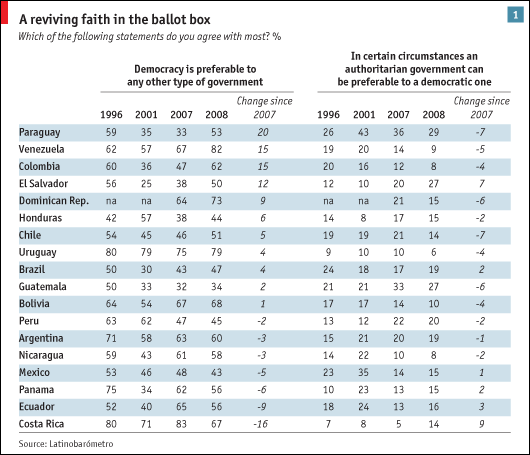
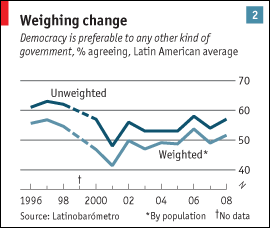 This year’s poll was taken in September and early October. It therefore reflects the sharp increase in inflation in the region in the first half of this year, but not the full effect of the financial turbulence and deteriorating economic outlook that hit some Latin American countries in recent weeks. Nevertheless, it carries some sobering lessons for the region’s politicians.
This year’s poll was taken in September and early October. It therefore reflects the sharp increase in inflation in the region in the first half of this year, but not the full effect of the financial turbulence and deteriorating economic outlook that hit some Latin American countries in recent weeks. Nevertheless, it carries some sobering lessons for the region’s politicians.
The poll underlines the fact that a small majority of respondents are convinced democrats (see table 1 and chart 2). In 12 countries, support for democracy has risen since 2001, when the region last suffered an economic recession. But only in five countries is it higher than it was in 1996. This year democracy has received a particular boost in Paraguay, a country where authoritarian attitudes previously predominated. The shift follows the victory in a presidential election in April of Fernando Lugo, a leftish former bishop who ended more than half a century of rule by the Colorado Party. That echoes similar hopes of change aroused by newly elected leaders in the region in recent years.
Conversely, in Venezuela, support for democracy may have been boosted this year among opponents of President Hugo Chávez, after their victory in a referendum on constitutional change last December. In Colombia, President Álvaro Uribe’s success against the FARC guerrillas may be the reason for a similar democratic lift.
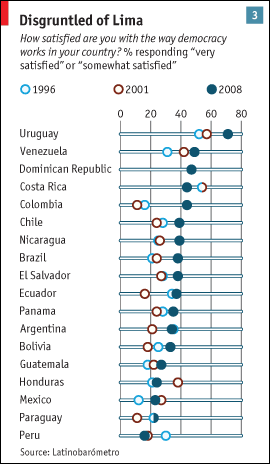 Uruguayans are by far the most satisfied with how their democracy works (see chart 3). Peruvians are particularly disgruntled. That is paradoxical: Peru’s economy has grown faster than that of any other of the region’s bigger countries both this year and last. Their discontent seems to reflect deep flaws in the political system. But even if slightly less than two-fifths of respondents across the region are satisfied with their democracies, that is a significant improvement on the 2001 figure.
Uruguayans are by far the most satisfied with how their democracy works (see chart 3). Peruvians are particularly disgruntled. That is paradoxical: Peru’s economy has grown faster than that of any other of the region’s bigger countries both this year and last. Their discontent seems to reflect deep flaws in the political system. But even if slightly less than two-fifths of respondents across the region are satisfied with their democracies, that is a significant improvement on the 2001 figure.
The relative dissatisfaction owes much to the deep-rooted socioeconomic inequalities in Latin America. Across the region 70% of respondents agreed that governments favour the interests of the privileged few; around half say they would not mind a non-democratic government if it solved economic problems; a similar proportion say democracy has not reduced inequalities; and only 30% think there is equality before the law. These attitudes help to explain the popularity of Mr Chávez, an oil-rich strongman--more than a third of Venezuelan respondents say inequalities have diminished.
But most respondents are convinced that democracy is the only road to development--and 71% say they are personally happy. So why the grumbles? As democracy has come to stay in the region, “people are more conscious of their rights and their expectations are higher”, says Marta Lagos, Latinobarómetro’s director. She adds that the yearning for a strongman is more a cultural trait than a political preference--and that the same goes for a fondness for a paternalist state.
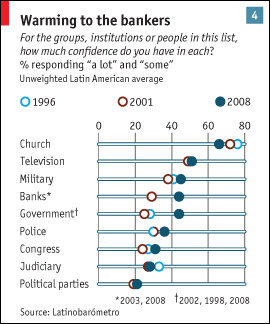 The poll shows that a large majority believe that pensions should be in state hands (see chart 5). In Argentina that number is 90%, which perhaps helps explain why President Cristina Fernández last month nationalised the private pension system. But at the same time 56% of respondents see a market economy as the road to development (up from 47% last year). And 32% declare themselves satisfied with privatised public services, up from 15% in 2004. Some 44% say they trust their banks, up from 29% in 2003. The church remains the most trusted institution in the region--but less so than it was. Trust in government and legislatures continues to edge up (see chart 4).
The poll shows that a large majority believe that pensions should be in state hands (see chart 5). In Argentina that number is 90%, which perhaps helps explain why President Cristina Fernández last month nationalised the private pension system. But at the same time 56% of respondents see a market economy as the road to development (up from 47% last year). And 32% declare themselves satisfied with privatised public services, up from 15% in 2004. Some 44% say they trust their banks, up from 29% in 2003. The church remains the most trusted institution in the region--but less so than it was. Trust in government and legislatures continues to edge up (see chart 4).
In six countries, including Mexico and Venezuela, crime and public safety are seen as the most important problem. In ten countries, economic concerns (unemployment, poverty and inflation) are still seen as paramount. In Brazil 19% cited health care as the biggest problem.
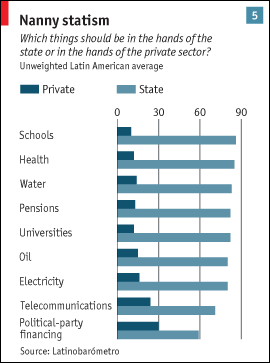 Despite the swing to the left in the region in recent years, most respondents to the poll consider themselves in the political centre (42% this year, up from 29% in 2003). Only 17% say they are on the left and 22% are on the right (even in Mr Chávez’s Venezuela those on the left and right are tied at 26%).
Despite the swing to the left in the region in recent years, most respondents to the poll consider themselves in the political centre (42% this year, up from 29% in 2003). Only 17% say they are on the left and 22% are on the right (even in Mr Chávez’s Venezuela those on the left and right are tied at 26%).
That provides hope for centre-right politicians in a round of presidential elections in the larger countries in the region in 2010-12. Those elections are likely to be held against a much less rosy economic backdrop than has prevailed for the past few years. The task facing Latin America’s politicians is to ensure that economic difficulties do not spill over into a weakening of support for democracy.
Latinobarómetro is a non-profit organisation based in Santiago, Chile, which has carried out regular surveys of opinions, attitudes and values in Latin America since 1995. The poll was taken by local opinion-research companies in 18 countries and involved 20,217 face-to-face interviews conducted between September 1st and October 11th 2008. The average margin of error is 3%. Further details from www.latinobarometro.org